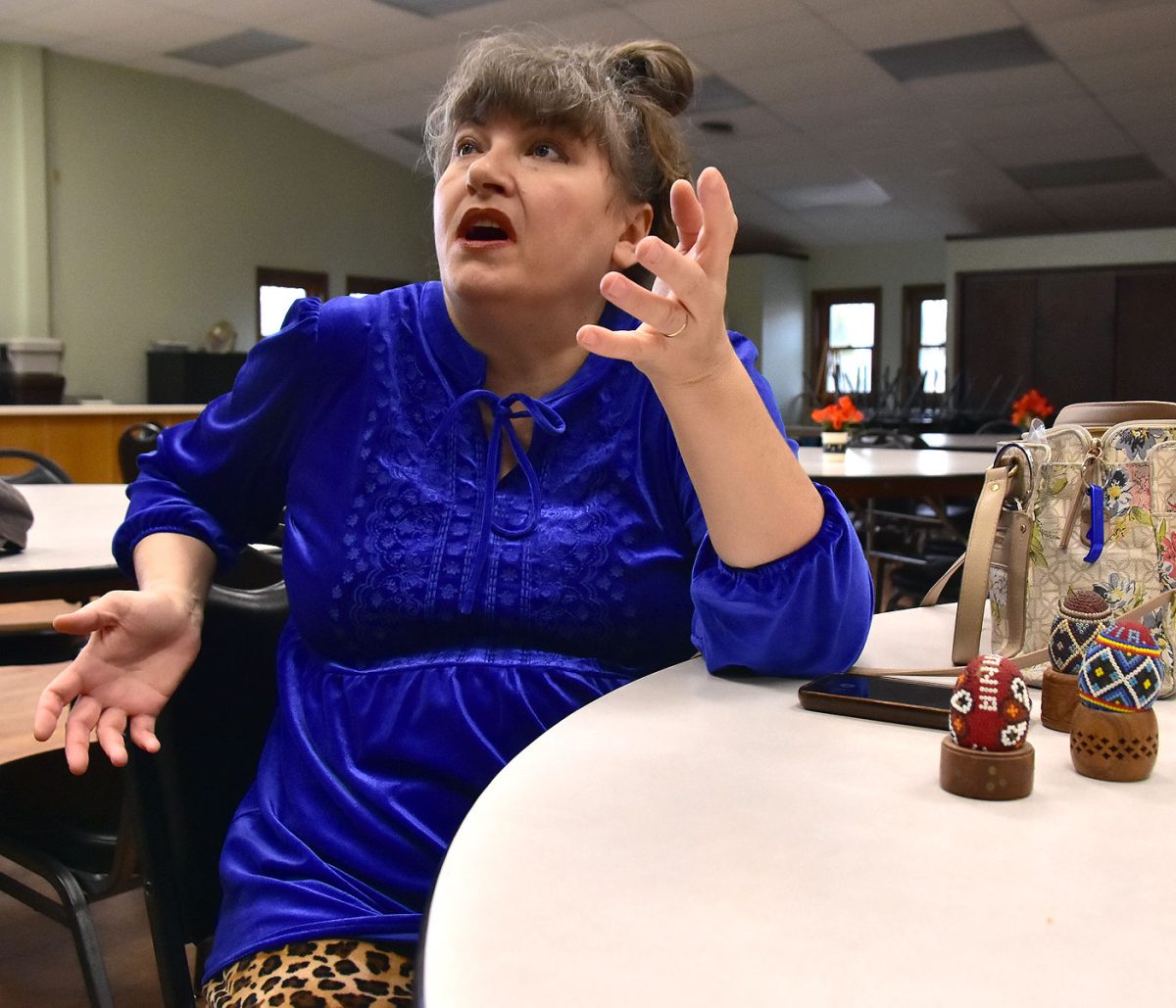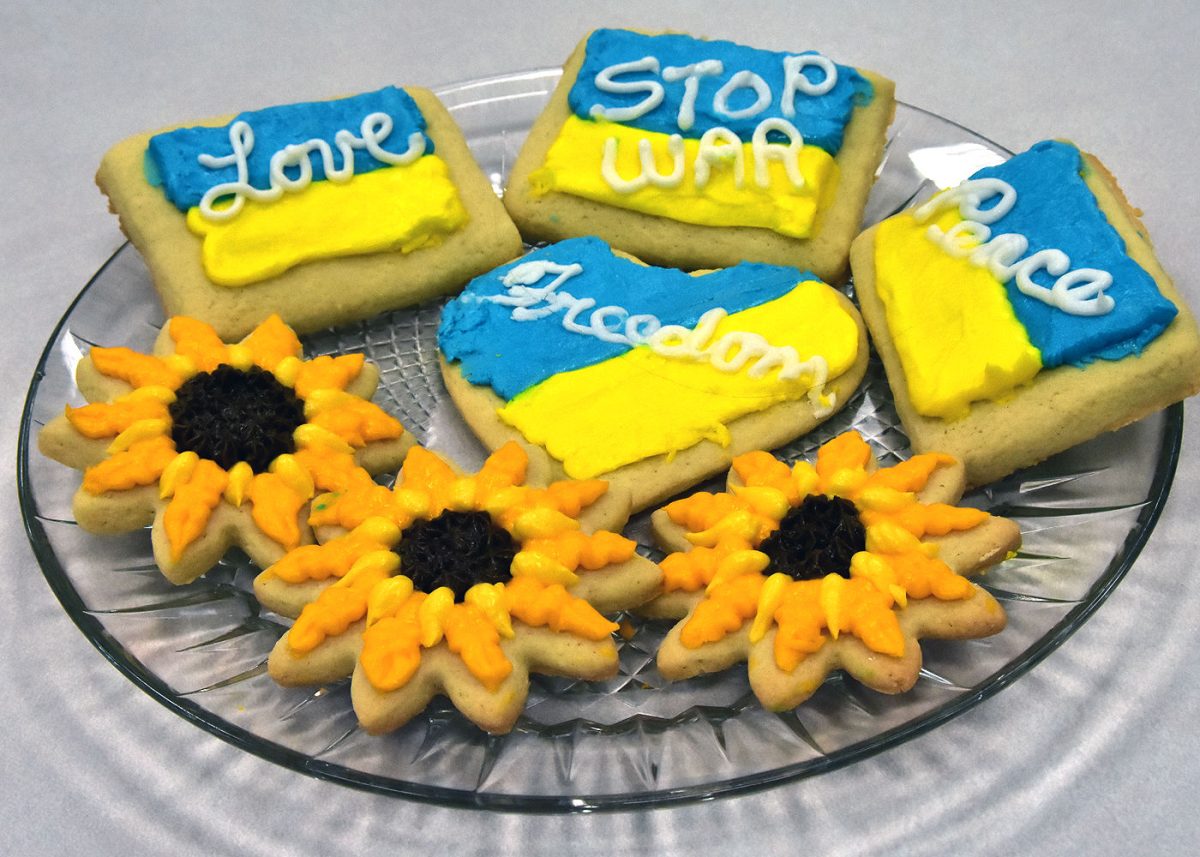On Feb. 24 Russian forces invaded Ukraine on three separate fronts in the largest assault in Europe since World War Two. Since then, estimates by the United Nations refugee agency (UNHCR) are that one million have fled Ukraine for neighboring countries, with the majority seeking refuge in Poland. Support for the Ukrainians has blossomed across Europe and the West, like the sunflower (Ukraine’s national flower), that has become a symbol of solidarity.
On Wednesday, May 4 the Solon United Methodist Church is hosting a Ukraine Benefit. Chicken noodle soup, Church Burgers, and some Ukrainian dishes such as sauerkraut soup, borscht, eggs made the Ukrainian way, and a vinaigrette salad will be served along with a bake sale featuring Ukrainian cookies and kolaches. In addition, there will be a “Kids Corner” with crafts to show support for Ukraine. Proceeds from the event will go to World Central Kitchen (WCK), a non-profit charity organization founded in 2010 by Jose Andres.
“World Central Kitchen started with a simple idea at home with my wife Patricia: when people are hungry, send in cooks. Not tomorrow, today,” Andres said on the organization’s webpage — http://wck.org. The first mission took the couple to Haiti in the aftermath of a devastating earthquake. Since then, WCK has deployed kitchens to Puerto Rico after Hurricane Maria, has fed people struggling through the Covid-19 pandemic and deployed to Australia in response to massive wildfires. WCK has also gone to tornado-ravaged parts of Kentucky, and to the Louisiana coast in the wake of a hurricane.
Currently WCK is providing chef-prepared meals to refuges at the Polish/Ukrainian border. In addition to serving hot meals, the organization hires Ukrainian refugees to help prepare and serve the food.
“Food relief is not just a meal that keeps hunger away,” Andres stated, “It’s a plate of hope. It tells you in your darkest hour that someone, somewhere, cares about you. This is the real meaning of comfort food. It’s why we make the effort to cook in a crisis.”
For members of the church, the war and resulting humanitarian crisis is not just something seen on the 24/7 daily news cycle, they have a personal connection. Girina Tatyana Georgievna, a native of Odessa, (southern) Ukraine moved to the United States 20 years ago, but still has a brother living in Ukraine, and other family members who have fled for Poland. She spoke with the Solon Economist about the situation on the ground in Ukraine and the human impact of the Russian invasion. Ukraine and Russia have long had a troubled history going back at least as far as the 16th century. Ukraine declared complete independence in January 1918 after centuries of conflict, but In 1922 Soviet troops invaded Ukraine and made it part of the Union of Soviet Socialist Republics (USSR), or more commonly, the Soviet Union. As the Soviet Union was meeting its demise, the Ukrainian parliament declared sovereignty in July 1990, and independence in August 1991. Russian forces invaded Ukraine in 2014 seizing territories such as the Crimean Peninsula. Various incidents and skirmishes have occurred since with several battles between Ukrainian forces and Russian-backed separatist groups.
“My brother still lives in Ukraine, and he is in war right now. His family, still there. Relatives, wife’s family, still there.” Tatyana said several times every day they have to seek shelter from air or missile attacks. Other times, “Explosions, wake up from explosions next to his house, next to my nephew’s house. Russia bombed oil factory one morning.”
For the civilians caught up in the war, humanitarian needs are growing. “My brother complained about, ‘I don’t need military help, I need some food to eat, to feed children,’ because his relatives and friends around him needs help, financial help, because all males from 18 to 60 now are going to war. Women stay alone with children. You know, its terrorism. Killing children, raping children, raping women. They need help.” She said her brother can’t go to his job because if he reports for work, he will be sent off to combat.
Tatyana’s 18-year old niece was sent to a friend’s house in Poland, for her safety. “I gave command to go to Poland. Go, go. Run, run. Get going.” Escaping the warzone, by train, also had risks as was evidenced by Russian forces bombing a train station. “Russia bombing train station. Kill children, women. Some say its fake, killing innocent people – its ‘fake.’ Awful, awful situation.” She said she’s glad to see nearly universal support for Ukraine. “Russia doing bad for no reason. Just no reason. It’s all fake what he (Russian president Vladimir Putin) says. He killed 11 children in two days. Five million people left Ukraine. How many thousand people, women, children, died? Killed by Russians.”
The benefit will be held from 5-8:00 p.m. in the Fellowship Hall.
For people desiring to do more, several organizations have been vetted as legitimate charities providing direct support in Ukraine and neighboring countries. Some of the vetted charities include:
The American Jewish Joint Distribution Committee – https://www.jdc.org
Kidsave – https://www.kidsave.org/standwithukraine/
Mercy Corps – https://www.mercycorps.org/donate/crisis-ukraine-give-now
Americares – https://www.americares.org
United Way Worldwide – https: secure.unitedway.org/a/unitedforukraine
Save the Children – https://www.savethechildren.org/us/where-we-work/ukraine
The International Committee of the Red Cross – https://icrc.org/en/donate/ukraine
Ukrainian cookies such as these will be available at a bake sale held in conjunction with a benefit dinner Wednesday, May 4 in the Fellowship Hall of the Solon United Methodist Church.


